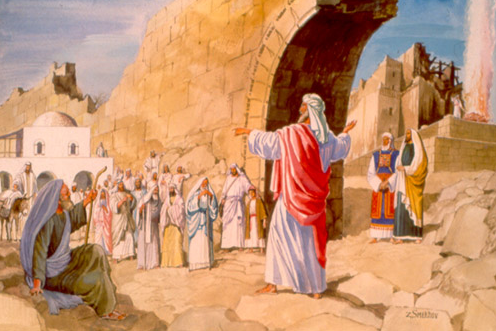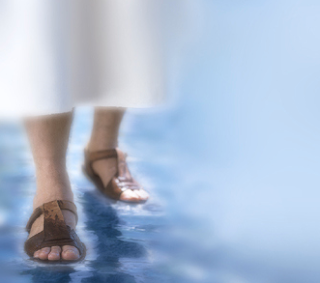"Slaughter of the Innocents"
by Carl Heinrich Bloch
TO CHEW ON: "A voice was heard in Ramah,
Lamentation and bitter weeping
Rachel weeping for her children,
Refusing to be comforted for her children
Because they are no more." Jeremiah 31:15
The incarnation story has its dark chapters. One of them is the account of King Herod and his actions after the wise men gave him the slip and "departed for their own country another way."
He was as sneaky as the Herod of Jesus' adult years (who Jesus called a fox). For on his first encounter with the Magi, after hearing from the chief priests and scribes about the part Bethlehem was to play in the prediction of a king, he had met the Magi secretly to determine when that star had first appeared.
When he realized that the wise men weren't coming back, he put all his information together and sent out his soldiers on a mission that makes our blood run cold: "He sent forth and put to death all the male children who were in Bethlehem and in all its districts from two years old and under, according to the time which he had determined from the wise men" - Matthew 2:16.
At this point in his telling, Matthew inserts a little author comment: "Then was fulfilled what was spoken by Jeremiah the prophet saying..." and he quotes word for word today's focus verse from Jeremiah.
As a parent reading the account of Herod's murderous initiative (Matthew 2:1-12), I am filled with empathy for those mothers. Imagine the disbelief, the apprehension, the confusion, and finally the heart-pounding terror as you face a heartless, sword-wielding soldier with your baby in your arms.
It's natural to ask, where was God in all this? How could He allow something so awful, something He obviously knew would happen because His Spirit had breathed these words into Jeremiah's ears centuries earlier.
Though we have probably never had our baby yanked from our arms by a soldier intent on obeying the order of a jealous king, having a child snatched from our arms by illness or accident is not so different. Which brings us face to face with the old dilemma: How can God, who is supposedly all-powerful and all-loving, allow bad things to happen to us?
Jerry Bridges addresses this question in his book Trusting God: Even when Life Hurts
"God's plan and His ways of working out His plan are frequently beyond our ability to fathom and understand. We must learn to trust where we don't understand.
[...] In order to trust God we must know Him in an intimate and personal way" Kindle locations 137 & 142.
How do we do that? In the same way we get to know people in an intimate and personal way. We spend time with them, listening to them — we listen to God when we read the Bible — and talking with them — we talk to God when we pray.
PRAYER: Dear God, please help me to know You so well that I trust You even when bad things happen to me. Amen.
MORE: Against the backdrop of the cross
Henry Blackaby tells this story in his book Experiencing God.
"When our only daughter, Carrie, was 16, the doctors told us she had an advanced case of cancer. We had to take her through chemotherapy and radiation. We suffered along with Carrie as we watched her experience the severe sickness that accompanies the treatments. Some people face such an experience by blaming God and questioning why He doesn't love them any more. Carrie's cancer treatments could have been a devastating experience for us. Did God still love us? Yes. Had His love changed? No. He still cared for us with an infinite love.*********
When you face circumstances like this, you can ask God to explain what is happening. We did that. We asked Him what we should do. I raised all those questions, but I never said, 'Lord, I guess You don't love me.'
Long before this experience with Carrie, I had made a determination: no matter what my circumstances, I would never look at my situation except against the backdrop of the cross. In the death and resurrection of Jesus Christ, God forever convinced me that He loved me. For this reason during Carrie's illness I could go before the Heavenly Father and see behind my daughter the cross of Jesus Christ. I said, 'Father, don't ever let me look at my life and question Your love for me. Your love for me was settled on the cross. That has never changed and will never change.' Our love relationship with the Heavenly Father sustained us through an extremely difficult time." Experiencing God Workbook, p. 51.
Unless otherwise noted all Scripture quotations are taken from the New King James Version®. Copyright © 1982 by Thomas Nelson, Inc. Used by permission. All rights reserved.





















